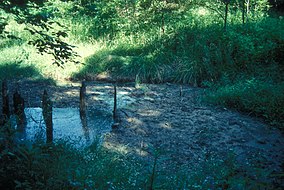Boone's Lick State Historic Site
Appearance
(Redirected from Boone's Lick)
| Boone's Lick State Historic Site | |
|---|---|
 The springs and remains of the saltworks | |
| Location | Howard County, Missouri, United States |
| Coordinates | 39°4′56″N 92°52′45″W / 39.08222°N 92.87917°W |
| Area | 51.17 acres (20.71 ha)[1] |
| Established | 1960[2] |
| Visitors | 4,885 (in 2022)[3] |
| Governing body | Missouri Department of Natural Resources |
| Website | Boone's Lick State Historic Site |
Boone's Lick State Historic Site is located in Missouri, United States, four miles east of Arrow Rock.[4] The park was established in 1960 around one of the saltwater springs that was used in the early 19th century. It was named after Nathan and Daniel Morgan Boone, sons of famous American frontiersman Daniel Boone, who produced salt from the springs.[5] The springs lent their name to the Boone's Lick Country, the first major American settlement in Missouri, and the Boone's Lick Road, which traversed wilderness from St. Charles, Missouri to the boomtown of Franklin, Missouri, in the early 1800s.
See also
[edit]References
[edit]- ^ "Boone's Lick State Historic Site: Data Sheet" (PDF). Missouri Department of Natural Resources. November 2017. Retrieved May 11, 2018.
- ^ "State Park Land Acquisition Summary". Missouri State Parks. Retrieved May 11, 2018.
- ^ "Missouri State Park Attendance For January - December, 2022" (PDF). Missouri State Parks. February 3, 2023.
- ^ "Boone's Lick State Historic Site". Missouri Department of Natural Resources. Retrieved May 11, 2018.
- ^ "Boone's Lick State Historic Site: General Information". Missouri Department of Natural Resources. Retrieved October 16, 2014.
External links
[edit]Wikimedia Commons has media related to Boone's Lick State Historic Site.
- Boone's Lick State Historic Site Missouri Department of Natural Resources
- Boone's Lick State Historic Site Map Missouri Department of Natural Resources


